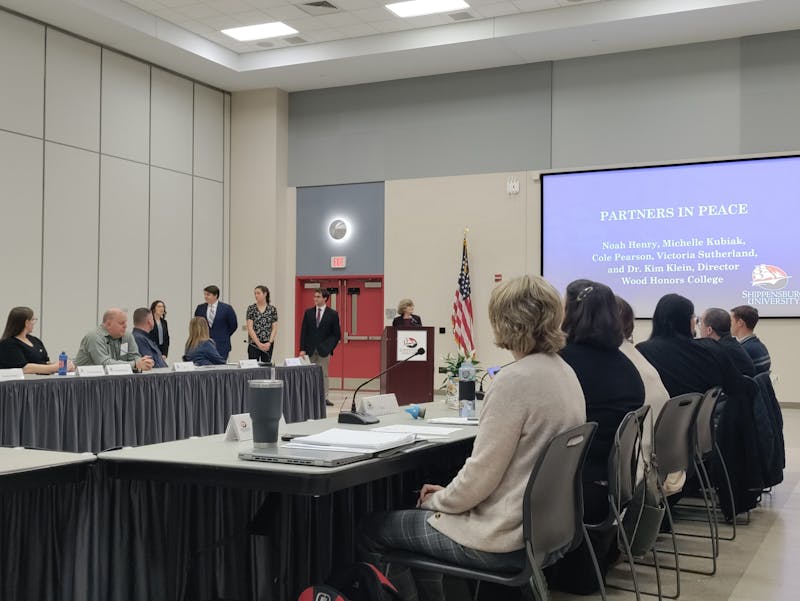800 National Guard troops and 500 federal law enforcement agents were deployed in Washington D.C. starting Monday, Aug. 11 under the orders of President Trump in what he calls an effort to crack down on the rise of violent crime in the city.
As a part of his plan, Trump placed the D.C. Metropolitan Police Department (MPD) under federal control.
In a Presidential Action titled “Restoring Law and Order in the District of Columbia,” published by the White House on Aug. 11, the president addressed recent incidents of assault and murder in the city as the reason for the mobilization.
When asked about his goals for D.C. during a press conference held at the Kennedy Center on Aug. 13, Trump argued: “If it’s dirty and unsafe, it sets a bad tone for the rest of the world … We’re going to have this capitol fixed up, safe, clean and beautiful, in a very short period of time.”
Additionally, Trump directed Secretary of Defense Pete Hegseth to coordinate with state governors for the deployment of National Guard soldiers as Hegseth deems necessary.
According to Trump, the deployment of National Guard troops and federal agents will last until he determines that “law and order” have been restored. The federal control over the MPD is under a thirty-day limit unless Congress approves of a long-term extension.
Opposition to the Trump administration was quick to address the president’s inaccurate claim that crime has been rising in the U.S. capitol. According to D.C. MPD statistics, the number of violent crime incidents is down 26% compared to last year. Throughout 2024, the number of violent crimes decreased by 35% compared to 2023 numbers.
In a press conference held on Aug. 11, D.C. Mayor Muriel Bowser responded to the president’s order with criticism while showing restraint.
“We are at a thirty-year violent crime low. We continue to look for ways to make our city safer,” Bowser said. She continued, suggesting that the president’s order does more to push an authoritarian agenda than improve public safety.
President Trump’s order has been backed by his supporters and the members of his administration. On Aug. 13, Trump’s border czar, Tom Homan, spoke to D.C. reporters.
“It sends a strong message of consequences … The president’s authority is never over,” said Homan. “The president’s going to do what he has to do to make this country safe again, and every city in this nation.”
Detering violent crime is not all Trump hopes to gain from the D.C. troop deployment. He has used the mobilization opportunity to detain any potential undocumented immigrants in D.C. and remove the city’s homeless encampments.
On Aug. 14, MPD Chief of Police Pamela A. Smith signed an executive order that allows the MPD to cooperate with federal immigration enforcement agencies on various tasks.
As directed by the order, MPD officers may assist immigration agents by sharing information about people not in MPD custody and providing transportation for said agents and detained subjects.
Officers may not detain individuals based off federal immigration warrants unless there is an additional criminal warrant or underlying offense for said individuals. Officers are also not to allow federal immigration enforcement agents to question individuals in MPD custody.
Tensions flared as Attorney General Pam Bondi attempted to name Drug Enforcement Admisitration Administrator Terry Cole as D.C.’s “Emergency Police Commissioner” on Aug. 14. If enacted, Cole would assume the powers and responsibilities of the D.C. Chief of Police.
Capitol leaders and hundreds of concerned residents were quick to oppose the attempt, leading to protests throughout the city. On Aug. 15, D.C. Attorney General Brian Schwalb filed a lawsuit against the Trump administration to halt the federal takeover of the MPD.
Attorney General Bondi rescinded her plan for Cole to be given authority over Washington D.C. police following Schwalb’s lawsuit. The Trump administration and D.C. Chief of Police Smith agreed on allowing MPD officers to cooperate with immigration enforcement agents.
The cooperation with immigration enforcement has caused tension for the government of D.C., especially when considering its status as a sanctuary city.
Issues in the U.S. capitol continue to escalate as several Republican-held states have pledged their cooperation with the Trump administration’s National Guard deployment. As of Aug. 17, the governors of West Virginia, South Carolina and Ohio have agreed to send a portion of their state’s National Guard troops.




The Slate welcomes thoughtful discussion on all of our stories, but please keep comments civil and on-topic. Read our full guidelines here.